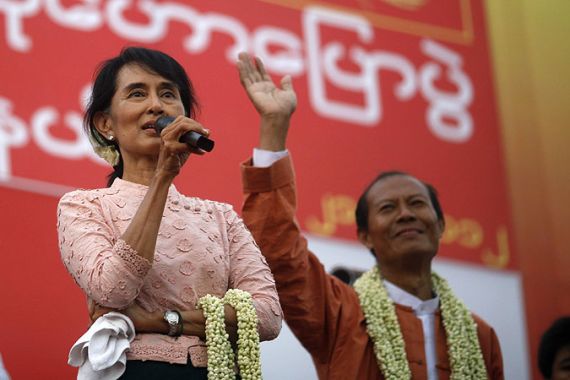Myanmar invites foreign election monitors
Observers from US, EU and ASEAN invited to oversee April vote as new civilian government seeks Western backing.

Myanmar has invited international observers, including from the European Union and the United States, to monitor the by-elections to be held next month, an official has said.
Observers from the United Nations and the Association of Southeast Asian Nations [ASEAN] have also been invited for the April 1 polls, a Myanmar government official said on Wednesday.
The ASEAN monitors have been asked to arrive in the commercial capital, Yangon, on March 28, just four days before the election, which will be held in 48 constituencies.
“It will be up to the countries whether they send people from overseas or inside Myanmar,” he told AFP news agency, without specifying how many monitors would be allowed.
“We welcome the invitation of observers,” Nyan Win, spokesman for Aung San Suu Kyi’s National League for Democracy (NLD) party, said. “They should be allowed to watch and assess freely.”
The vote, which will see Nobel Peace Prize laureate Aung San Suu Kyi stand for a seat in parliament for the first time, comes a year after a quasi-civilian government took power following the end of decades of outright military rule.
Western legitimacy
Victoria Nuland, a US state department spokesperson, said Myanmar had invited two US observers and three US journalists.
“We will obviously take up this opportunity to monitor,” she said.
“But we would obviously encourage the Burmese government to try to bring this monitoring effort as closely as they can to international standards.”
There was no official reaction from the European Union, but an EU official in Bangkok who did not want to be named said that at least six months of preparations were usually needed for an observation mission.
A 2010 election in Myanmar which swept the army’s political allies to power was marred by widespread complaints of cheating and intimidation.
Foreign election observers and international media were not allowed into the country for that vote, which was denounced by Suu Kyi’s opposition party and Western powers as a sham.
Since then the regime has surprised observers with reforms including welcoming the opposition back into mainstream politics, signing ceasefire deals with ethnic minority rebels and releasing hundreds of political prisoners.
Sanctions concerns
Suu Kyi’s party cannot threaten the ruling party’s majority even with a strong result in next month’s vote to fill 48 parliamentary seats.
But experts believe the regime wants the pro-democracy leader to win a place in parliament to give its reform drive legitimacy and encourage the West to ease sanctions.
The NLD won a landslide victory in an election in 1990, but the then ruling junta never allowed the party to take power, and instead kept Suu Kyi under house arrest for most of the time since then.
She was released from her latest stretch in detention just days after the 2010 vote.